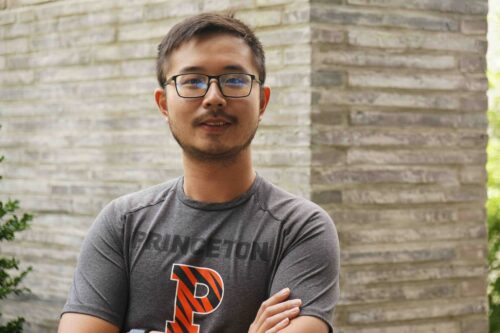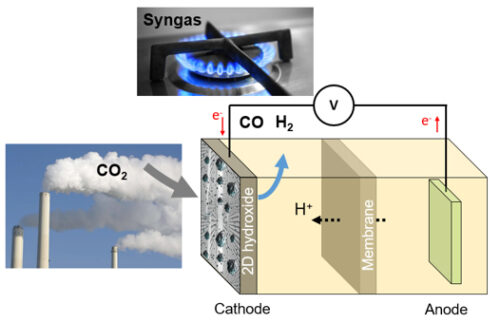By Molly A. Seltzer

Sunxiang (Sean) Zheng has been selected as the newest Distinguished Postdoctoral Fellow with a focus on developing a novel material for capturing carbon dioxide at industrial facilities like power plants. Zheng’s work blends civil and environmental engineering, material science and chemistry.
During his graduate studies at UC-Berkeley, Zheng developed nanomaterial-enabled membranes for water filtration. At Princeton, Zheng will work to synthesize a new membrane to capture carbon dioxide and make the gas more easily convertible into carbonate minerals or hydrocarbons that can be used as fuel sources. Zheng will collaborate with professors Claire White and Z. Jason Ren. White is associate professor of civil and environmental engineering and the Andlinger Center for Energy and the Environment, and acting associate director for research at the center (AY 2020-21). Ren is a professor of civil and environmental engineering and the Andlinger Center for Energy and the Environment, associate director for research, and acting director of the center. A faculty review committee selected Zheng for his excellent academic record and the potential of his research to facilitate interdisciplinary projects between several labs at Princeton, one of the goals of the fellowship program.
Capturing carbon dioxide typically requires highly corrosive solvents, and most methods demand large energy expenditures to isolate and store the carbon; in power plants, for example, carbon capture requires 20-30% of the plants’ total energy output. Through his research and the Distinguished Postdoctoral Fellowship, Zheng will facilitate collaboration between White’s and Ren’s labs to create a more efficient way to capture and use carbon dioxide.
Zheng and White are working to create a porous 2D nanomaterial to provide a safer and more energy efficient way of filtering the carbon dioxide out of smokestacks. White works with 2D materials, those with a dimension less than 100 nanometers. These materials, which are so thin they are nearly invisible, can be extremely difficult produce. Last year, White was granted an award from Princeton E-ffiliates Partnership to work on producing a 2D nanomaterial made of calcium hydroxide, after having shown computationally that it could effectively capture carbon dioxide. Zheng brings to the table experience designing, synthesizing, and characterizing such materials.
The porous material the research team hopes to create is similar to a filter for an air conditioning unit. The carbon dioxide gas stream would flow through pipes at industrial plants and reach the membrane material that traps the gas. An electric voltage is used to electrochemically reduce the carbon dioxide to carbon monoxide, a high-value chemical used to produce syngas and metals and a variety of acids and alcohols. Instead of using energy to simply release the carbon dioxide from the membrane and store it in underground wells, the process would help valorize carbon dioxide by producing a useful product with the gas, while preventing atmospheric carbon dioxide pollution.
 Developing an electrochemical cell within the filter chamber where the reduction would take place, will rely on Ren’s expertise on electrochemistry and water systems engineering. Zheng will work with members in Ren’s WET Lab to develop new processes and reactor systems that enable efficient separation and resource recovery.
Developing an electrochemical cell within the filter chamber where the reduction would take place, will rely on Ren’s expertise on electrochemistry and water systems engineering. Zheng will work with members in Ren’s WET Lab to develop new processes and reactor systems that enable efficient separation and resource recovery.
“This fellowship allows me to lead multidisciplinary research on novel materials and techniques that will contribute to solving problems at the water-energy-carbon nexus,” Zheng said.
“Zheng’s expertise in developing 2D nanomaterials is key to finding new materials that will be critical to creating the types of closed loop systems that will help mitigate climate change via capture of carbon dioxide,” said White.
Zheng received his Ph.D. in environmental engineering from University of California, Berkeley and M.S. from University of Maryland, College Park. He earned a B.S. from Zhejiang University of Technology in China in water supply and sewage engineering.
Related articles:
- Claire White wins 2026 Robert L’Hermite Medal
- Recycled cements drive down emissions without slacking on strength
- Andlinger Center supports investigations into green steelmaking, solid-state batteries, and geologic hydrogen production
- Andlinger Center awards six grants to jumpstart industry-academic collaborations on energy and environmental challenges
- Distinguished Postdoctoral Fellows develop stable insulating polymers and origami-inspired robots
- Claire White promoted to full professor
- Experts tackle industrial decarbonization at Andlinger Center retreat
- Pennsylvania policymakers underestimate public support for solar projects, survey says